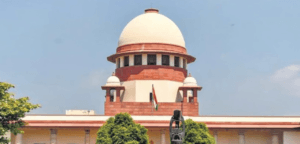4 Key Arguments in Owaisi’s Plea to Enforce the 1991 Act
The Supreme Court of India will hear petitions challenging the Places of Worship Act on February 17, 2025. This 1991 law aims to maintain the religious character of places of worship as they existed on August 15, 1947. Owaisi, among others, seeks its strict enforcement, while some argue the Act is arbitrary and restricts religious rights.

4 Key Arguments in Owaisi’s Plea to Enforce the 1991 Act
The Supreme Court of India has agreed to hear a petition filed by Asaduddin Owaisi, along with other similar petitions, regarding the implementation of the 1991 Places of Worship Act. The matter will be taken up on February 17, 2025. Owaisi’s petition, filed on December 17, 2024, calls for the enforcement of the law, which mandates that the religious character of places of worship should remain as it was on August 15, 1947. This plea follows a recent ruling by a bench headed by Chief Justice Sanjiv Khanna, which prohibited courts from entertaining new suits or issuing orders in ongoing cases related to reclaiming religious places, particularly mosques and dargahs.
Owaisi’s petition also urges the Centre to ensure the effective implementation of the law, citing instances where courts have ordered surveys of mosques in response to pleas by Hindu litigants. The Muslim side has called for strict adherence to the law to preserve communal harmony and maintain the current status of mosques that some Hindu petitioners claim were originally temples.
The 1991 Places of Worship (Special Provisions) Act prohibits the conversion of places of worship and requires the preservation of their religious character as it existed on August 15, 1947. The Act, however, made an exception for the Ram Janmabhoomi site in Ayodhya, which led to the Supreme Court’s 2019 verdict granting the disputed land to the deity Ram Lalla.
On the other hand, the Hindu side argues that the Act is arbitrary, questioning the justification for using August 15, 1947, as the cut-off date and arguing that there is no logical link between India’s political independence and addressing the civilizational conflict arising from colonial suppression and Islamic invasions.
4 Key Arguments in Owaisi’s Plea to Enforce the 1991 Act The Supreme Court has agreed to consider Asaduddin Owaisi’s petition alongside other ongoing cases related to the 1991 Places of Worship Act. The court has scheduled the hearing for February 17, 2025. Owaisi’s petition, filed in December 2024, advocates for the strict enforcement of the Act, which aims to preserve the religious status of places of worship as they were on August 15, 1947, with an exception for the Ram Janmabhoomi-Babri Masjid site in Ayodhya due to ongoing litigation.
The Act has been a subject of legal and political debates, especially in the wake of the 2019 Supreme Court verdict on Ayodhya, where the Court upheld the law as an essential part of India’s secular framework. Owaisi’s petition seeks to prevent any alteration of religious sites and enforce penalties for violations of the law.
The Supreme Court has already consolidated petitions from BJP leader Subramanian Swamy and others who challenge the Act, claiming it restricts the right to reclaim religious sites allegedly destroyed during historical invasions. These petitioners argue that the Act unfairly restricts Hindus, Buddhists, Jains, and Sikhs from reclaiming religious sites while exempting other communities.
Muslim groups, including the Jamiat Ulama-i-Hind, have opposed these challenges, arguing that striking down the law could destabilize the country’s social fabric and communal harmony. They emphasize that reopening historical disputes risks exacerbating tensions among minorities. The Supreme Court’s 2019 verdict highlighted the importance of the Act in maintaining equality and upholding secular principles, including non-retrogression, which prevents reopening settled issues.
4 Key Arguments in Owaisi’s Plea to Enforce the 1991 Act While the Act has been largely uncontested for decades, challenges began mounting with petitions seeking surveys of mosques, leading the Court to issue directives to prevent new suits or surveys, which could fuel communal tensions.
The Supreme Court will hear Asaduddin Owaisi’s plea regarding the implementation of the Places of Worship Act in February, alongside similar petitions filed by Muslim organizations like Jamiat Ulema-i-Hind. The hearing is scheduled for February 17, 2025.
Owaisi’s petition calls for the strict enforcement of the 1991 Act, which mandates maintaining the religious character of places of worship as they existed on August 15, 1947. This comes amid ongoing litigation across India, with several petitions requesting surveys of centuries-old mosques to determine their religious character.
In December 2024, the Supreme Court issued a directive barring courts from registering new petitions or passing interim orders, including conducting surveys, until the matter is fully heard. This ruling has paused around 18 lawsuits filed by Hindu groups, which sought surveys to confirm the original religious identity of various mosques, including Gyanvapi in Varanasi and Shahi Idgah in Mathura.
Hindu petitioners argue that the Places of Worship Act is unconstitutional, claiming it removes the right to judicial remedy to reclaim religious sites. Meanwhile, Muslim petitioners, including Owaisi, stress the need for the Act’s strict enforcement, warning that weakening it could have severe consequences for communal harmony.
Check out TimesWordle.com for all the latest news
You must be logged in to post a comment.